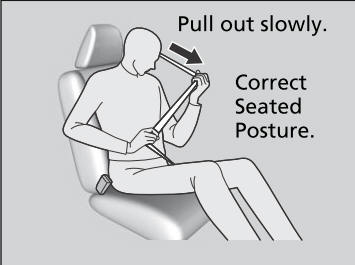Honda CR-V: Front Airbags (SRS) / Operation
Front airbags are designed to inflate during moderate-to-severe frontal collisions. When the vehicle decelerates suddenly, the sensors send information to the control unit which signals one or both front airbags to inflate.
A frontal collision can be either head-on or angled between two vehicles, or when a vehicle crashes into a stationary object, such as a concrete wall.
 Housing Locations
Housing Locations
The front airbags are housed in the center of the steering wheel for the
driver, and
in the dashboard for the front passenger. Both airbags are marked SRS AIRBAG...
 How the Front Airbags Work
How the Front Airbags Work
While your seat belt restrains your torso, the
front airbag provides supplemental protection
for your head and chest.
The front airbags deflate immediately so that
they won't interfere with the driver's visibility
or the ability to steer or operate other
controls...
Other information:
Honda CR-V 2017-2026 Owner's Manual: To cancel
To cancel the LKAS: Press the MAIN or LKAS button. The LKAS is turned off every time you stop the engine, even if you turned it on the last time you drove the vehicle. Pressing the MAIN button also turns ACC with Low Speed Follow on and off. The system operation is suspended if you: Set the wipers to continuous operation...
Honda CR-V 2017-2026 Owner's Manual: How to Select a Play Mode
You can select repeat, random, and scan modes when playing a file. Available mode icons appear above the play mode buttons. Press the button corresponding to the mode you want to select. To turn off a play mode Press the selected button. Play Mode Menu Items Repeat Repeat One Folder: Repeats all files in the current folder...
Categories
- Manuals Home
- Honda CR-V Owners Manual
- Honda CR-V Service Manual
- TPMS Calibration
- Odometer and Trip Meter
- Rear Seats
- New on site
- Most important about car
Fastening a Seat Belt
After adjusting a front seat to the proper position, and while sitting upright and well back in the seat:
Pull the seat belt out slowly.

Copyright © 2026 www.hocrv.com
